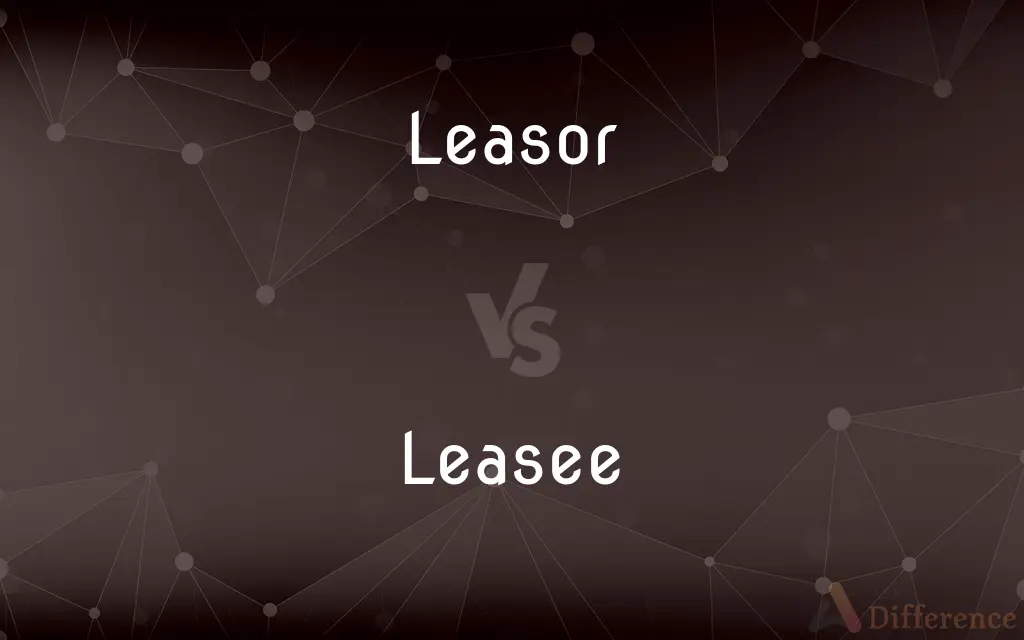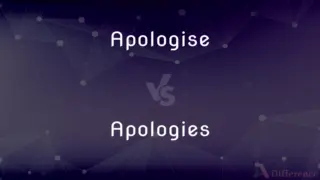Leasor vs. Leasee — What's the Difference?
By Tayyaba Rehman & Fiza Rafique — Updated on November 2, 2023
The leasor is the entity that owns the property and grants the lease, while the leasee is the one who obtains the right to use the property.

Difference Between Leasor and Leasee
Table of Contents
ADVERTISEMENT
Key Differences
A leasor is the party in a lease agreement that holds the title to the property. They have the right to grant occupancy or use of their property to another party. In contrast, the leasee is the one who receives the right to occupy or use the property. The leasor may impose certain conditions that the leasee must agree to before taking possession of the property.
The leasee enters into the agreement to use the property for a specific period as stipulated in the lease agreement. While the leasee has possession of the property, the leasor retains ownership. The rights of the leasee during the lease term are usually limited to use, while the leasor may have broader powers, including the right to sell the property or terminate the lease under certain conditions.
Responsibility for maintenance and repairs often falls on the leasor, though this can be transferred to the leasee depending on the lease terms. The leasor must ensure the property is in good condition for the leasee to use as agreed. Conversely, the leasee is typically responsible for keeping the property in the condition it was received, barring normal wear and tear.
Financially, the leasor is entitled to receive rent from the leasee. This is one of the primary incentives for leasors to lease out their property. The leasee, on the other hand, must make timely payments to the leasor as compensation for using the property. Failure to do so can result in financial penalties or termination of the lease.
At the end of the lease term, the leasee is generally required to return the property to the leasor in the agreed-upon condition. The leasor has the right to inspect the property and assess any damages that may impact the return of any deposit to the leasee. The leasee's use of the property is bound by the lease duration, and they must vacate the property upon its expiration, unless the lease is renewed.
ADVERTISEMENT
Comparison Chart
Role in Agreement
Grants the right to use property
Receives the right to use property
Ownership
Retains ownership of the property
Does not gain ownership
Responsibilities
May be responsible for maintenance
Responsible for rent and care
Financial Obligation
Receives rent
Pays rent
Duration of Relationship
Ends with lease termination
Ends with lease expiration
Compare with Definitions
Leasor
A lessor in a leasing contract.
The leasor received the monthly rent on the first day of the month.
Leasee
The tenant in a lease agreement.
The leasee paid a security deposit before moving in.
Leasor
The owner of leased property.
The leasor conducted an annual inspection of the apartment.
Leasee
A party that pays for the temporary use of property.
The leasee opted for a two-year lease term.
Leasor
The party providing rights of usage to another.
The leasor updated the lease to include new terms.
Leasee
An individual or entity who takes possession of property under a lease.
The leasee called to report a plumbing issue.
Leasor
One who leases property to a leasee.
The leasor drafted a lease agreement for the new tenants.
Leasee
One who holds the right to use leased property.
The leasee renovated the leased storefront.
Leasor
A person or entity who grants a lease.
The leasor placed a For Rent sign in front of the building.
Leasee
The recipient of a lease from the leasor.
The leasee requested an extension on the lease.
Common Curiosities
What does a leasee do?
A leasee pays rent to occupy or use property for a specified time.
Can a leasor refuse to renew a lease?
Yes, a leasor can refuse renewal unless bound by local laws or prior agreement.
Can a leasee sublease the property?
Only if the lease agreement explicitly grants permission.
Who is the leasor in a lease agreement?
The leasor is the property owner or agent who provides the property for lease.
Is a leasee responsible for property taxes?
Typically, the leasor pays property taxes unless the lease states otherwise.
Who maintains the property, leasor or leasee?
Maintenance responsibility varies by lease but often primarily falls on the leasor.
What is a leasor’s lien?
It’s a legal right the leasor holds to seize a leasee’s property for unpaid rent.
Do leasees have a right to buy the property?
Not unless there is a lease-to-own clause in the agreement.
Can the leasor end a lease early?
Yes, if stipulated in the lease agreement or if the leasee breaches the contract.
What happens if a leasee damages the property?
The leasee may lose their security deposit or face additional charges.
Can a leasor enter the property without permission?
Generally, no, unless for emergency repairs or as stated in the lease.
Are leasors required to provide a safe environment?
Yes, leasors must ensure the property meets safety standards.
Is a leasee's rent fixed for the lease term?
Usually, rent is fixed unless the lease specifies rent adjustments.
Can a leasee run a business on leased residential property?
Only if the lease allows for commercial use.
Can a leasee renew a lease before it ends?
Yes, if the leasor agrees, they can negotiate a renewal before expiration.
Share Your Discovery

Previous Comparison
Apologise vs. Apologies
Next Comparison
Cow vs. SowAuthor Spotlight
Written by
Tayyaba RehmanTayyaba Rehman is a distinguished writer, currently serving as a primary contributor to askdifference.com. As a researcher in semantics and etymology, Tayyaba's passion for the complexity of languages and their distinctions has found a perfect home on the platform. Tayyaba delves into the intricacies of language, distinguishing between commonly confused words and phrases, thereby providing clarity for readers worldwide.
Co-written by
Fiza RafiqueFiza Rafique is a skilled content writer at AskDifference.com, where she meticulously refines and enhances written pieces. Drawing from her vast editorial expertise, Fiza ensures clarity, accuracy, and precision in every article. Passionate about language, she continually seeks to elevate the quality of content for readers worldwide.
















































